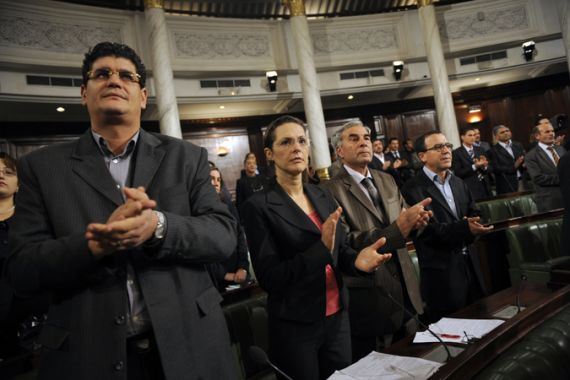Tunisian assembly adopts provisional constitution
Document paves the way for the creation of a new government, but was opposed by one-third of the constituent assembly.

 |
| Islamists and secularists outside the assembly clashed over the role of Islam in the new constitution [Reuters] |
Tunisia’s constituent assembly has adopted a provisional constitution that sets the stage for the country to name a new government, nearly two months after its first post-revolution election.
The 217-member assembly, elected in November, individually approved each of the 26 clauses of the document to get state institutions back on the move.
The adopted document outlines the conditions and procedures to be followed by the country’s executive, legislature and judiciary until general elections are held, possibly in a year, and a final constitution is agreed.
The vote – 141 in favour, 37 against and 39 abstentions from a boycotting opposition – came after a tumultuous five-day debate that saw thousands of people demonstrating outside the assembly building, at times over what role Islam should play in the country’s new order.
“The people are sick of waiting. Let’s get down to work, enough messing around,” one politician from the dominant moderate Islamist Ennahdha party, Amar Larayedh, shouted shortly after the session began on Tuesday.
The outgoing government of Beji Caid Essebsi, formed after the January 14 oustingof longtime ruler Zine El Abidine Ben Ali, has officially resigned, and many Tunisians have expressed growing impatience at the institutional limbo.
‘Historic moment’
The election of a president and creation of a new government could only take place once polticians adopted the “mini-constitution”.
“This is a historic moment, a memorable night, the beginning of a new Tunisia,” said assembly president Mustapha Ben Jaafar, as deputies sang the national anthem and those of Ennahdha, which has 98 deputies, congratulated each
other on the outcome of the vote.
Ben Jaafar said he was “proud to head an assembly that groups Tunisia’s best, thanks to the revolution of its brave people”.
Ben Jaafar said candidacies for the presidency were open and added that the new head of state would be elected on Monday afternoon.
Hamadi Jebali, the 63-year-old deputy leader of Ennahdha, is likely take the position of prime minister under a deal between the country’s three-party ruling coalition.
Jebali, a former doctor and president of the Tunisian human rights league, spent 15 years in Ben Ali’s jails before being forced into exile.
The less-powerful position of president will probably go to 66-year-old Moncef Marzouki, a longtime opponent of Ben Ali and head of the Congress for the Republic Party (CPR), which has 29 deputies.
Ennahdha joined with the left-wing CPR and Ettakatol, the third-largest party with 20 deputies, to form the ruling coalition.
Ben Jaafar, the head of Ettakatol, is likely to become president of the parliament.
Opposition boycott
Under the provisional constitution, the president must be “exclusively Tunisian, of the Muslim religion”, the child of Tunisian parents and at least 35 years old.
During heated debates, some deputies had suggested allowing people with dual nationalities to run for president and said the constitution should expressly give each Tunisian man and woman the right to stand in presidential elections.
The opposition boycotted Saturday’s vote, arguing that the prime minister will hold too many powers at the expense of the president.
The president will outline the country’s foreign policy in agreement with the head of government, and is the head of the armed forces. But he only names or dismisses senior officers in agreement with the prime minister.
Another controversial provision hands over executive and legislative powers to the president of parliament, the head of state and the prime minister in the event of force majeure, not to the prime minister alone.
Ordinary Tunisians, as well as the press and social media, followed the debates which were broadcast live by television with unprecedented interest.